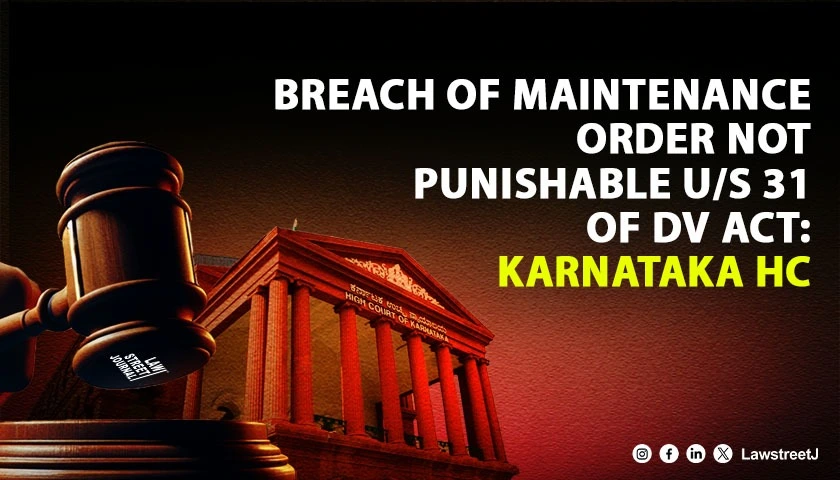Karnataka: The Karnataka High Court has held that the penalty under Section 31 of the Protection of Women from Domestic Violence Act, 2005 would get attracted only for breach of protection orders passed under Section 18 and not apply to maintenance orders under Section 20 of the law.
A bench of Justice Shivashankar Amarannavar said so, while dismissing a petition filed by a woman from Bengaluru.
The woman had filed a petition before the magistrate seeking monthly maintenance of Rs 20,000 and Rs 15 lakh as marriage expenses, along with the return of gold jewellery. In the meantime, she filed for interim maintenance under Section 23(2) of the DV Act.
On November 22, 2014, the magistrate granted Rs 3,000 as monthly interim maintenance. The husband initially paid Rs 8,000 but failed to pay the remaining money.
The wife moved a petition with a complaint under Section 31 of the DV Act, seeking action against the husband for breaching the interim protection order.
On January 28, 2017, the magistrate convicted the husband and sentenced him to six-month simple imprisonment or a fine of Rs 20,000. On an appeal filed by the husband, the sessions court set aside the magistrate order.
Challenging this order, the wife moved the high court, contending that non-compliance with maintenance orders would attract provisions under Section 31.
The High Court, however, pointed out that the language of Section 31 is unambiguous and refers only to protection and interim protection orders. The provision (Section 31) applies exclusively to Section 18 protection orders, not to residence, monetary, custody or compensation orders under Sections 19-22, the court said.
The court said that the legislature included ‘protection orders’ alone under Section 31 of the DV Act after specifically categorising the orders which would be given under the head ‘protection orders’ under Section 18.
Providing two separate reliefs, one under Section 18 of the DV Act for protection and another for monetary relief under Section 20 will have to be taken into consideration while analysing the scope of Section 31. If protection order was inclusive of monetary relief of granting maintenance, Section 20 of the DV Act would not have been separately provided, the bench said.
From a bare perusal of Section 31 of the Act, it is apparent that it speaks about protection order and interim protection order. It does not speak about monetary orders, the court added.
The court also considered the implications and ramifications of widening the scope of Section 31.
“Moreover, if such a wide interpretation is given, the courts will be over-flooded with cases under Section 31 of the DV Act, and the said situation cannot be said to have been intended by the legislature. Therefore, the court cannot overturn the legislative wisdom to hold that a ‘monetary relief’ such as payment of maintenance, if disobeyed, the same also would attract a significant penalty under Section 31 of the DV Act, treating the same as a breach of ‘protection order’ or ‘interim protection order’,” the court said.
The bench also pointed out Section 31 of the DV Act creates an offence.
"It is the rule of interpretation of the statute that criminal statutes are to be strictly construed because they deprive a citizen of his life and liberty, and no act, which does not fall within the purview of the criminal statute, can be added to it by way of interpretation," the bench said.







![Karnataka High Court: Cabinet Rank Status Not Equivalent to Ministerial Position [Read Order]](/secure/uploads/2023/09/lj_2318_fc1b99b7-aeed-472b-836e-33750bedb394.jpg)


![Woman living in adultery cannot claim maintenance: Karnataka High Court [Read Order]](/secure/uploads/2023/10/lj_3083_Women_living.jpg)




